2023年中考英语语法复习 被动语态课件(共38张PPT)
文档属性
| 名称 | 2023年中考英语语法复习 被动语态课件(共38张PPT) |  | |
| 格式 | zip | ||
| 文件大小 | 132.9KB | ||
| 资源类型 | 教案 | ||
| 版本资源 | 人教新目标(Go for it)版 | ||
| 科目 | 英语 | ||
| 更新时间 | 2022-07-28 08:47:47 | ||
图片预览

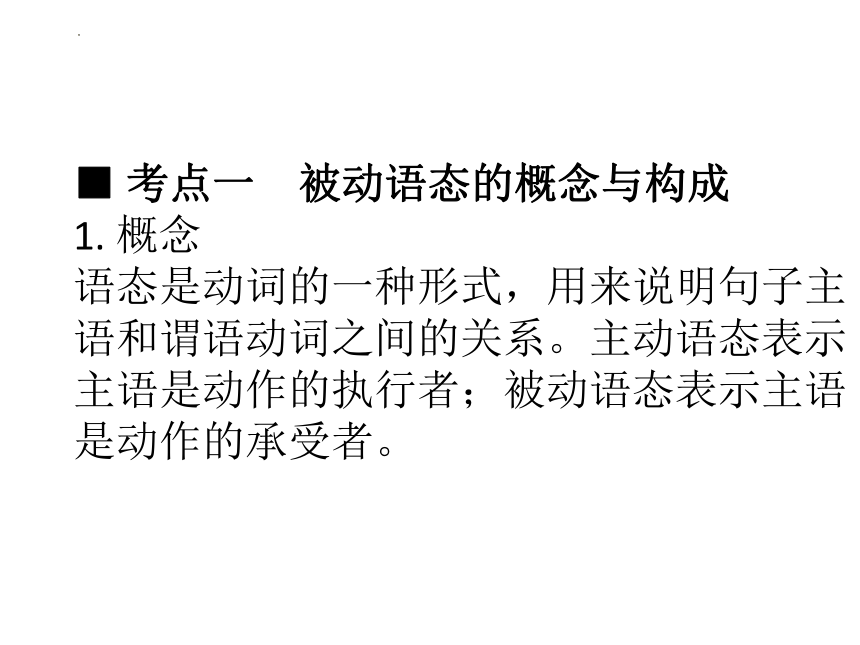
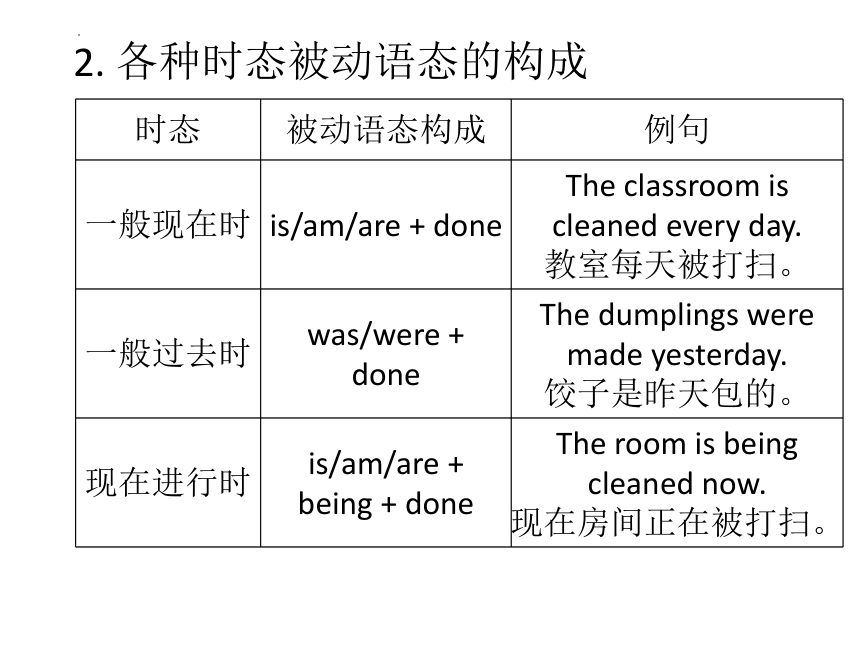
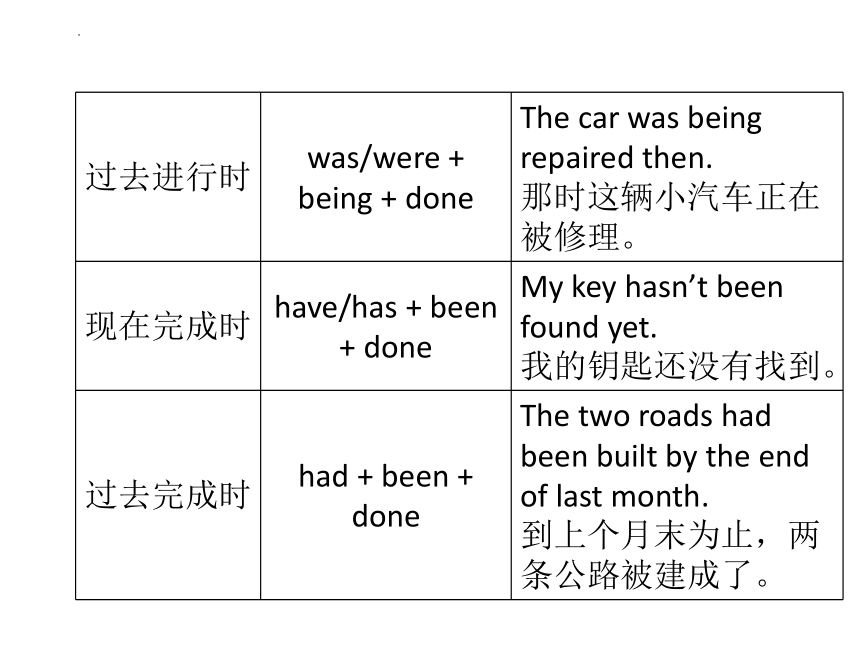
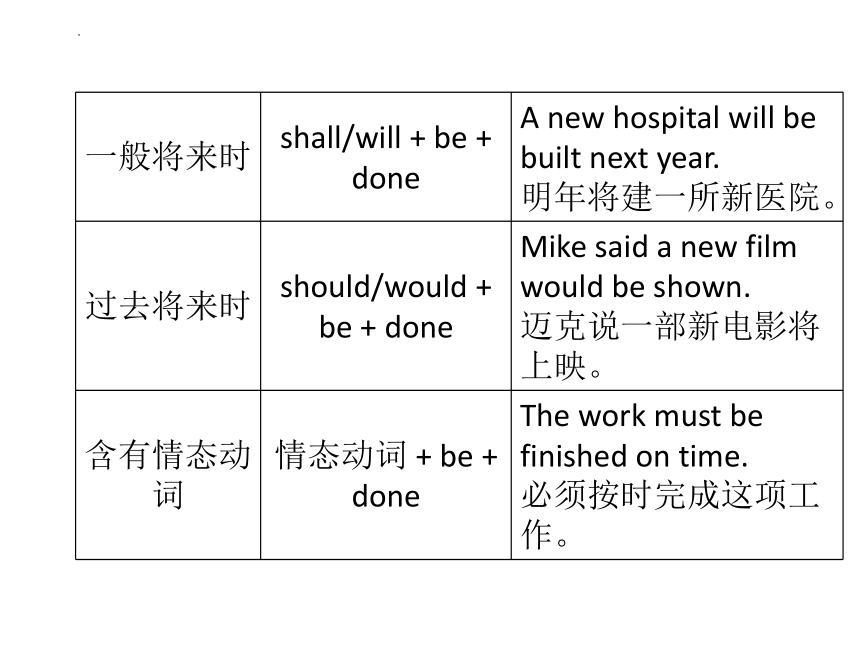
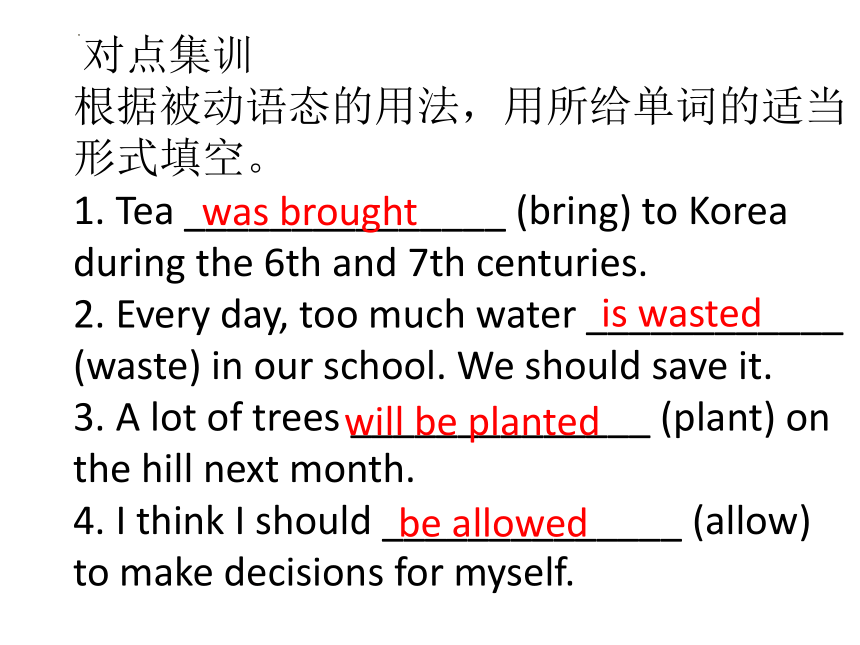
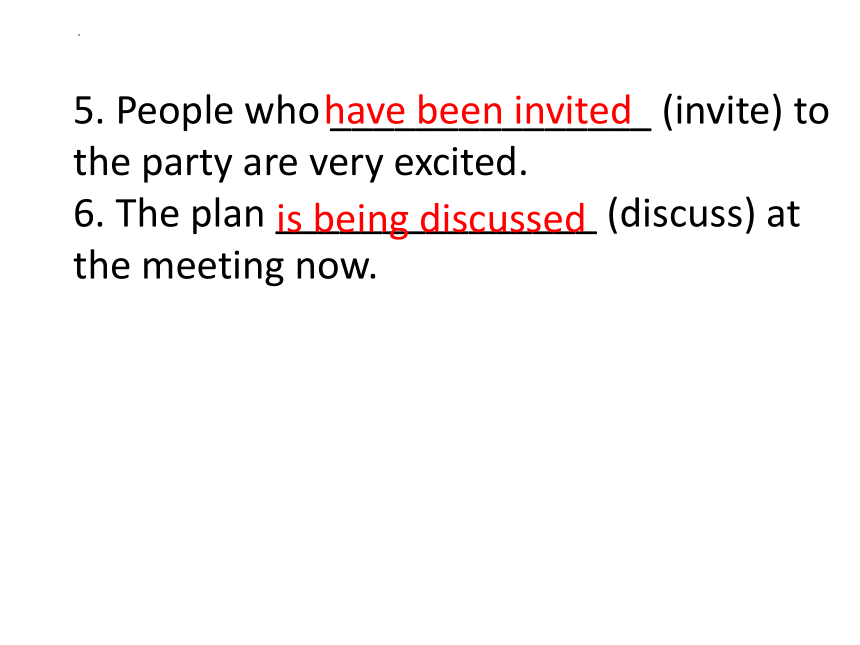
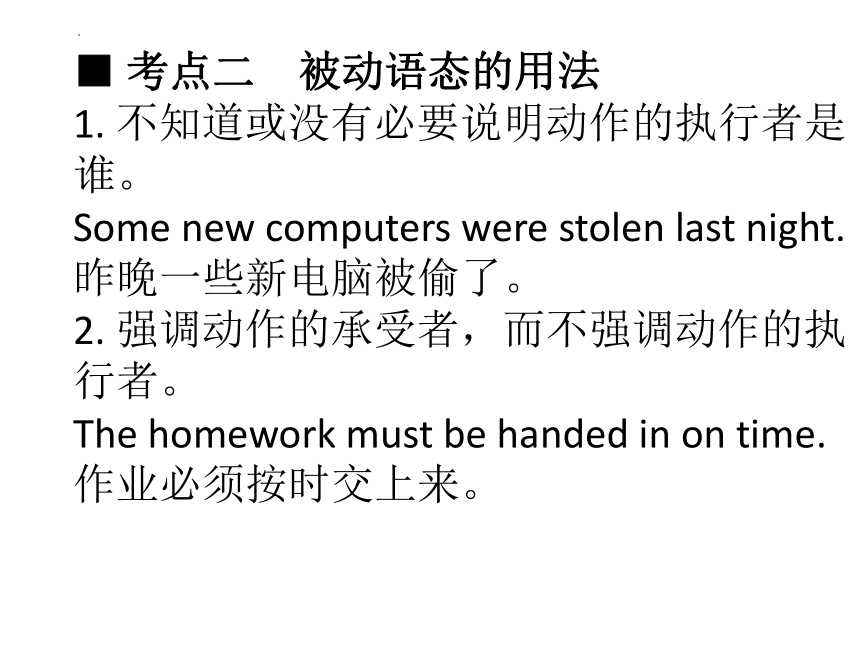
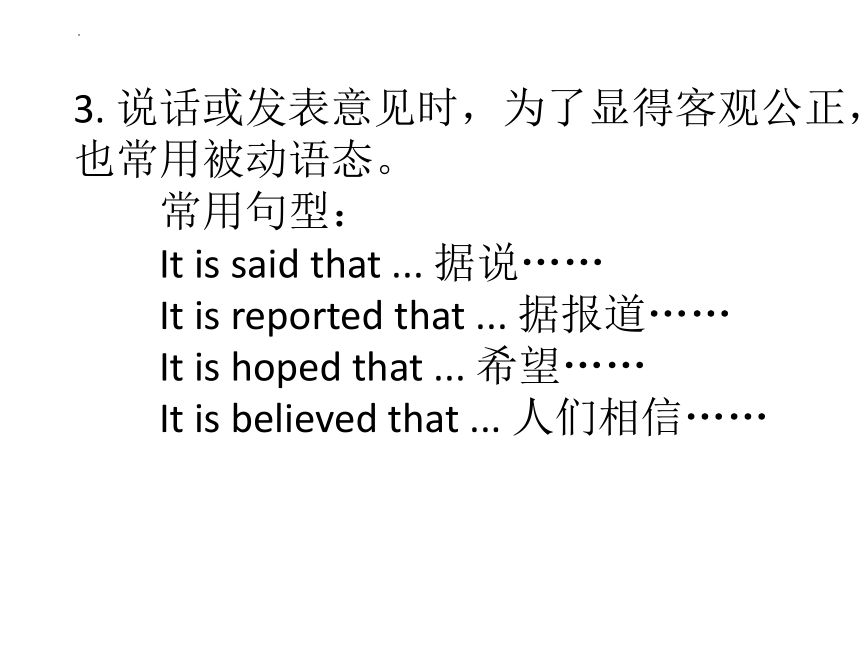
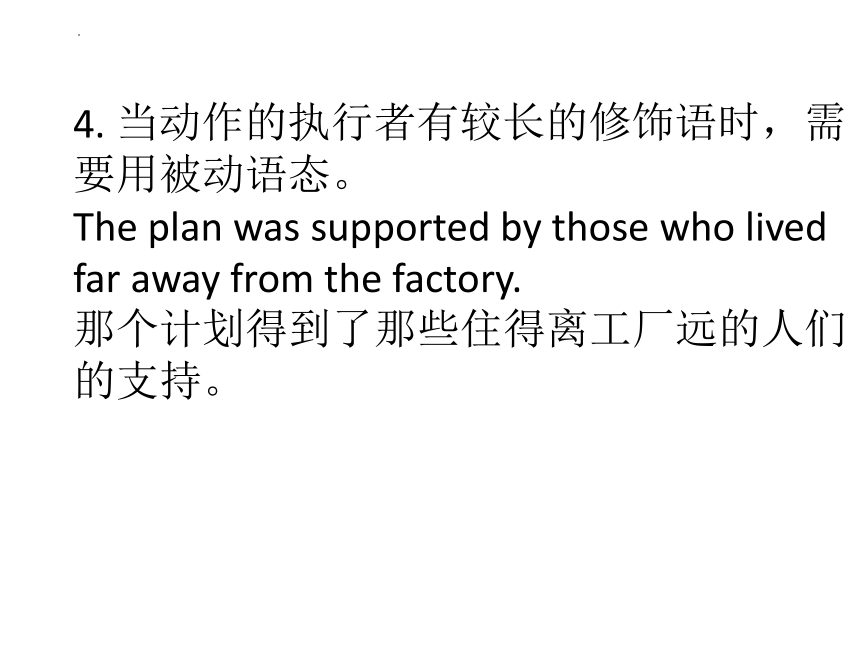
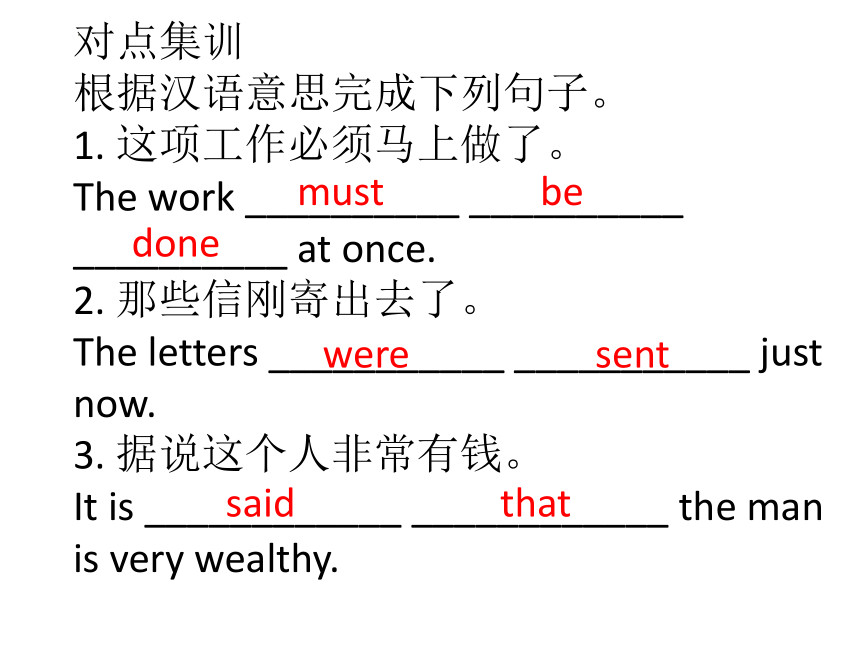
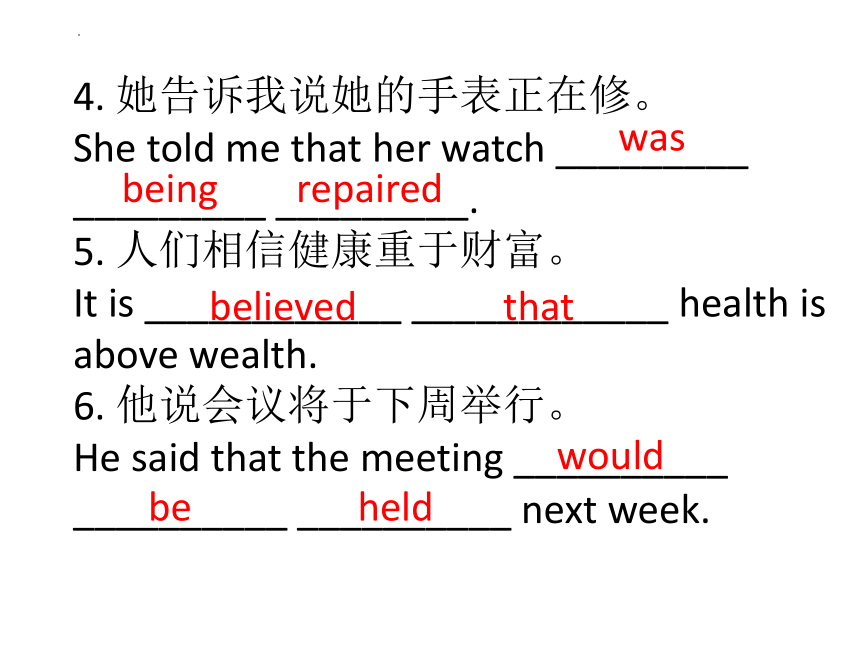
文档简介
(共38张PPT)
中考英语语法复习
被动语态
九年级英语备课组
■ 考点一 被动语态的概念与构成
1. 概念
语态是动词的一种形式,用来说明句子主语和谓语动词之间的关系。主动语态表示主语是动作的执行者;被动语态表示主语是动作的承受者。
2. 各种时态被动语态的构成
时态 被动语态构成 例句
一般现在时 is/am/are + done The classroom is cleaned every day.
教室每天被打扫。
一般过去时 was/were + done The dumplings were made yesterday.
饺子是昨天包的。
现在进行时 is/am/are + being + done The room is being cleaned now.
现在房间正在被打扫。
过去进行时 was/were + being + done The car was being repaired then.
那时这辆小汽车正在被修理。
现在完成时 have/has + been + done My key hasn’t been found yet.
我的钥匙还没有找到。
过去完成时 had + been + done The two roads had been built by the end of last month.
到上个月末为止,两条公路被建成了。
一般将来时 shall/will + be + done A new hospital will be built next year.
明年将建一所新医院。
过去将来时 should/would + be + done Mike said a new film would be shown.
迈克说一部新电影将上映。
含有情态动词 情态动词 + be + done The work must be finished on time.
必须按时完成这项工作。
对点集训
根据被动语态的用法,用所给单词的适当形式填空。
1. Tea _______________ (bring) to Korea during the 6th and 7th centuries.
2. Every day, too much water ____________ (waste) in our school. We should save it.
3. A lot of trees ______________ (plant) on the hill next month.
4. I think I should ______________ (allow) to make decisions for myself.
was brought
is wasted
will be planted
be allowed
5. People who _______________ (invite) to the party are very excited.
6. The plan _______________ (discuss) at the meeting now.
have been invited
is being discussed
■ 考点二 被动语态的用法
1. 不知道或没有必要说明动作的执行者是谁。
Some new computers were stolen last night.
昨晚一些新电脑被偷了。
2. 强调动作的承受者,而不强调动作的执行者。
The homework must be handed in on time.
作业必须按时交上来。
3. 说话或发表意见时,为了显得客观公正,也常用被动语态。
常用句型:
It is said that ... 据说……
It is reported that ... 据报道……
It is hoped that ... 希望……
It is believed that ... 人们相信……
4. 当动作的执行者有较长的修饰语时,需要用被动语态。
The plan was supported by those who lived far away from the factory.
那个计划得到了那些住得离工厂远的人们的支持。
对点集训
根据汉语意思完成下列句子。
1. 这项工作必须马上做了。
The work __________ __________ __________ at once.
2. 那些信刚寄出去了。
The letters ___________ ___________ just now.
3. 据说这个人非常有钱。
It is ____________ ____________ the man is very wealthy.
must be
done
were sent
said that
4. 她告诉我说她的手表正在修。
She told me that her watch _________ _________ _________.
5. 人们相信健康重于财富。
It is ____________ ____________ health is above wealth.
6. 他说会议将于下周举行。
He said that the meeting __________ __________ __________ next week.
was
being repaired
believed that
would
be held
■ 考点三 主动语态转化为被动语态的方法
1. 基本句式“主语 + 谓语 + 宾语”的转换
主动句变为被动句的步骤一般分三步:
a. 将主动句的宾语变为被动句的主语;
b. 将谓语动词由主动形式改为被动形式“be + 过去分词”;
c. 将主动句的主语改为被动句中介词 by 的宾语(by 短语有时可以省去)。
2. 句式“主语 + 谓语 + 间接宾语 + 直接宾语”的转换
含有双宾语的主动句变为被动句时,有两种方式:
a. 可将间接宾语变为被动结构的主语,直接宾语不变。
My grandma gave me a present yesterday. →
I was given a present (by my grandma) yesterday.
b. 也可以将直接宾语变为被动结构的主语,这时,应在间接宾语前加介词 to 或 for。
My father bought me a new computer. →
A new computer was bought for me (by my father).
小贴士:
一般来说,间接宾语前带 to 的动词有 bring, give, hand, send, teach, show, tell, offer, pass, take, sell, lend 等;间接宾语前带 for 的动词有 buy, cook, make, save, get 等。
3. 句式“主语 + 谓语 + 宾语 + 宾语补足语”的转换
含有宾语补足语的主动句变为被动句时,可将其宾语变为被动结构的主语,宾语补足语留在原处作主语的补足语。
The man painted the door green yesterday. →
The door was painted green yesterday.
4. 祈使句的转换
肯定祈使句变为被动句时,用“Let + 宾语 + be + 过去分词”句式;否定祈使句变为被动句时,用“Don’t let + 宾语 + be + 过去分词”句式。
Keep the book on the desk. →
Let the book be kept on the desk.
Don’t put the knife here. →
Don’t let the knife be put here.
对点集训
将下列句子变为被动语态。
1. She can finish the work in an hour.
→The work __________ __________ __________ by her in an hour.
2. Jack broke a cup yesterday.
→A cup ____________ ____________ by Jack yesterday.
3. He gives a present to me today.
→A present __________ __________ __________ me by him today.
can be finished
was broken
is given
to
4. Mary would return the book soon.
→The book __________ __________ __________ by Mary soon.
5. They have built a bridge over the river.
→A bridge __________ __________ __________ over the river by them.
6. My father is watering the flowers in the garden.
→The flowers _________ _________ _________ by my father in the garden.
would be
returned
has been
built
are being
watered
■ 考点四 被动语态的几种特殊情况
1. make, see, watch, hear, notice, feel 等使役动词和感官动词在主动语态中与省略 to 的动词不定式连用,但变为被动语态时,必须还原 to。
I often see the old man run in the morning.
我经常看到这位老人在早上跑步。
The old man is often seen to run in the morning.
这位老人经常被看见在早上跑步。
2. 一些动词短语用于被动语态时,动词短语应视为一个整体,而不能丢掉其中的介词或副词。
I can take good care of the little dog.
我可以照顾好这条小狗。
The little dog can be taken good care of (by me).
这条小狗可以被(我)照顾得很好。
对点集训
将下列句子变为被动语态。
1. I bought my best friend a new dress.
→A new dress _________ _________ _________ my best friend.
2. She tells me to wait at the school gate.
→I __________ __________ __________ wait at the school gate.
3. We are carrying out the task.
→The task __________ __________ __________ __________ by us.
was bought
for
am told to
is being
carried out
4. We saw a stranger enter the office.
→A stranger _________ __________ __________ enter the office.
5. Will they ask me to make a report next Monday
→Will I _________ _________ _________ make a report next Monday
6. You can borrow all kinds of books from the library.
→All kinds of books __________ __________ __________ __________ the library.
was seen
to
be asked to
can
be borrowed from
■ 考点五 主动语态表被动意义的几种情况
1. 不及物动词与状语连用,用以表示主语的品质和状态。常见的动词有:cut, sell, read, write, fill, cook, lock, wash, drive, keep等。
The books sell well. 这些书销售得很好。
2. 连系动词如 smell, taste, feel, sound, prove 等,可以用主动形式表示被动意义。
The apples taste nice. 苹果尝起来很好吃。
3. 不定式在某些形容词之后,如 easy, difficult, hard, impossible 之后,与主语有动宾关系。
The question is difficult to answer.
这个问题是很难回答的。
4. “have/get + 宾语 + 过去分词”这个结构也表达了一种被动的意思。
I’ll have the bike repaired soon.
我将尽快请人修理这辆自行车。
5. 作实义动词的 need, want, require 表示“需要”,接动名词时表达被动的意思,其含义相当于动词不定式的被动形式。
Your vegetables need watering (to be watered).
你的蔬菜需要浇水了。
6. 表示开始、结束类的动词如 start, begin, open, close, finish, stop, end 等,可以用主动形式表示被动意义。
Classes begin at half past eight.
八点半开始上课。
7. 形容词 worth 后跟动名词的主动形式表示被动意义。
The museum is worth visiting.
那个博物馆值得参观。
对点集训
用所给单词的适当形式填空。
1. Good medicine __________ (taste) bitter to the mouth.
2. I had my shoes __________ (mend) just now.
3. The article is easy __________ (understand).
4. The meeting __________ (begin) at nine o’clock this morning.
tastes
mended
to understand
began
5. The book is really worth __________ (read).
6. This kind of book __________ (sell) well.
reading
sells
■ 考点六 被动语态与系表结构的区别
1. 被动语态表示动作,而系表结构表示状态或情况。
The shop is closed at six o’clock in the afternoon.
这家商店下午6点关门。(表示动作)
The shop is closed today.
这家商店今天不开门。(表示状态)
2. 被动语态可以用于进行时,而系表结构多用于一般现在时或一般过去时。
The bridge is being painted. 这座桥正在被油漆。
The bridge is painted. 那座桥已经油漆完了。
3. 被动语态可以由介词 by 引出动作的执行者,而系表结构常跟其他介词。
I was interested by the story.
这个故事使我感兴趣。
I was interested in computer studies.
我对电脑课感兴趣。
4. 系表结构可以用 very, so, quite, too, rather, more, most 等词修饰,而被动语态可以用 greatly, widely 等词修饰。
I was not so satisfied with what you did.
我对你做的不是很满意。
I was greatly moved by this moving story.
我被这个感人的故事深深感动了。
5. 谓语动词带有时间、地点或方式状语时,多半是被动语态。
The window was broken yesterday.
这个窗户是昨天被打破的。
6. 被动语态常由“be + 过去分词”构成,而系表结构除了用 be 之外,还可以用其他连系动词。
He became interested in English.
他开始对英语感兴趣了。
对点集训
翻译下列句子。
1. 这家超市下午5点关门。
________________________________________________________________________
2. 这把雨伞修好了。
________________________________________________________________________
The supermarket is closed at five o’clock in the afternoon.
The umbrella is mended/repaired.
3. 她说的话使他感兴趣。
________________________________________________________________________
4. 肥皂在我们日常生活中广泛使用。
________________________________________________________________________
He was interested by what she said.
Soap is widely used in our daily lives.
5. 那辆小汽车是昨天晚上被偷的。
________________________________________________________________________
6. 我开始对所有的科目感兴趣了。
________________________________________________________________________
The car was stolen last night.
I became interested in all my subjects.
中考英语语法复习
被动语态
九年级英语备课组
■ 考点一 被动语态的概念与构成
1. 概念
语态是动词的一种形式,用来说明句子主语和谓语动词之间的关系。主动语态表示主语是动作的执行者;被动语态表示主语是动作的承受者。
2. 各种时态被动语态的构成
时态 被动语态构成 例句
一般现在时 is/am/are + done The classroom is cleaned every day.
教室每天被打扫。
一般过去时 was/were + done The dumplings were made yesterday.
饺子是昨天包的。
现在进行时 is/am/are + being + done The room is being cleaned now.
现在房间正在被打扫。
过去进行时 was/were + being + done The car was being repaired then.
那时这辆小汽车正在被修理。
现在完成时 have/has + been + done My key hasn’t been found yet.
我的钥匙还没有找到。
过去完成时 had + been + done The two roads had been built by the end of last month.
到上个月末为止,两条公路被建成了。
一般将来时 shall/will + be + done A new hospital will be built next year.
明年将建一所新医院。
过去将来时 should/would + be + done Mike said a new film would be shown.
迈克说一部新电影将上映。
含有情态动词 情态动词 + be + done The work must be finished on time.
必须按时完成这项工作。
对点集训
根据被动语态的用法,用所给单词的适当形式填空。
1. Tea _______________ (bring) to Korea during the 6th and 7th centuries.
2. Every day, too much water ____________ (waste) in our school. We should save it.
3. A lot of trees ______________ (plant) on the hill next month.
4. I think I should ______________ (allow) to make decisions for myself.
was brought
is wasted
will be planted
be allowed
5. People who _______________ (invite) to the party are very excited.
6. The plan _______________ (discuss) at the meeting now.
have been invited
is being discussed
■ 考点二 被动语态的用法
1. 不知道或没有必要说明动作的执行者是谁。
Some new computers were stolen last night.
昨晚一些新电脑被偷了。
2. 强调动作的承受者,而不强调动作的执行者。
The homework must be handed in on time.
作业必须按时交上来。
3. 说话或发表意见时,为了显得客观公正,也常用被动语态。
常用句型:
It is said that ... 据说……
It is reported that ... 据报道……
It is hoped that ... 希望……
It is believed that ... 人们相信……
4. 当动作的执行者有较长的修饰语时,需要用被动语态。
The plan was supported by those who lived far away from the factory.
那个计划得到了那些住得离工厂远的人们的支持。
对点集训
根据汉语意思完成下列句子。
1. 这项工作必须马上做了。
The work __________ __________ __________ at once.
2. 那些信刚寄出去了。
The letters ___________ ___________ just now.
3. 据说这个人非常有钱。
It is ____________ ____________ the man is very wealthy.
must be
done
were sent
said that
4. 她告诉我说她的手表正在修。
She told me that her watch _________ _________ _________.
5. 人们相信健康重于财富。
It is ____________ ____________ health is above wealth.
6. 他说会议将于下周举行。
He said that the meeting __________ __________ __________ next week.
was
being repaired
believed that
would
be held
■ 考点三 主动语态转化为被动语态的方法
1. 基本句式“主语 + 谓语 + 宾语”的转换
主动句变为被动句的步骤一般分三步:
a. 将主动句的宾语变为被动句的主语;
b. 将谓语动词由主动形式改为被动形式“be + 过去分词”;
c. 将主动句的主语改为被动句中介词 by 的宾语(by 短语有时可以省去)。
2. 句式“主语 + 谓语 + 间接宾语 + 直接宾语”的转换
含有双宾语的主动句变为被动句时,有两种方式:
a. 可将间接宾语变为被动结构的主语,直接宾语不变。
My grandma gave me a present yesterday. →
I was given a present (by my grandma) yesterday.
b. 也可以将直接宾语变为被动结构的主语,这时,应在间接宾语前加介词 to 或 for。
My father bought me a new computer. →
A new computer was bought for me (by my father).
小贴士:
一般来说,间接宾语前带 to 的动词有 bring, give, hand, send, teach, show, tell, offer, pass, take, sell, lend 等;间接宾语前带 for 的动词有 buy, cook, make, save, get 等。
3. 句式“主语 + 谓语 + 宾语 + 宾语补足语”的转换
含有宾语补足语的主动句变为被动句时,可将其宾语变为被动结构的主语,宾语补足语留在原处作主语的补足语。
The man painted the door green yesterday. →
The door was painted green yesterday.
4. 祈使句的转换
肯定祈使句变为被动句时,用“Let + 宾语 + be + 过去分词”句式;否定祈使句变为被动句时,用“Don’t let + 宾语 + be + 过去分词”句式。
Keep the book on the desk. →
Let the book be kept on the desk.
Don’t put the knife here. →
Don’t let the knife be put here.
对点集训
将下列句子变为被动语态。
1. She can finish the work in an hour.
→The work __________ __________ __________ by her in an hour.
2. Jack broke a cup yesterday.
→A cup ____________ ____________ by Jack yesterday.
3. He gives a present to me today.
→A present __________ __________ __________ me by him today.
can be finished
was broken
is given
to
4. Mary would return the book soon.
→The book __________ __________ __________ by Mary soon.
5. They have built a bridge over the river.
→A bridge __________ __________ __________ over the river by them.
6. My father is watering the flowers in the garden.
→The flowers _________ _________ _________ by my father in the garden.
would be
returned
has been
built
are being
watered
■ 考点四 被动语态的几种特殊情况
1. make, see, watch, hear, notice, feel 等使役动词和感官动词在主动语态中与省略 to 的动词不定式连用,但变为被动语态时,必须还原 to。
I often see the old man run in the morning.
我经常看到这位老人在早上跑步。
The old man is often seen to run in the morning.
这位老人经常被看见在早上跑步。
2. 一些动词短语用于被动语态时,动词短语应视为一个整体,而不能丢掉其中的介词或副词。
I can take good care of the little dog.
我可以照顾好这条小狗。
The little dog can be taken good care of (by me).
这条小狗可以被(我)照顾得很好。
对点集训
将下列句子变为被动语态。
1. I bought my best friend a new dress.
→A new dress _________ _________ _________ my best friend.
2. She tells me to wait at the school gate.
→I __________ __________ __________ wait at the school gate.
3. We are carrying out the task.
→The task __________ __________ __________ __________ by us.
was bought
for
am told to
is being
carried out
4. We saw a stranger enter the office.
→A stranger _________ __________ __________ enter the office.
5. Will they ask me to make a report next Monday
→Will I _________ _________ _________ make a report next Monday
6. You can borrow all kinds of books from the library.
→All kinds of books __________ __________ __________ __________ the library.
was seen
to
be asked to
can
be borrowed from
■ 考点五 主动语态表被动意义的几种情况
1. 不及物动词与状语连用,用以表示主语的品质和状态。常见的动词有:cut, sell, read, write, fill, cook, lock, wash, drive, keep等。
The books sell well. 这些书销售得很好。
2. 连系动词如 smell, taste, feel, sound, prove 等,可以用主动形式表示被动意义。
The apples taste nice. 苹果尝起来很好吃。
3. 不定式在某些形容词之后,如 easy, difficult, hard, impossible 之后,与主语有动宾关系。
The question is difficult to answer.
这个问题是很难回答的。
4. “have/get + 宾语 + 过去分词”这个结构也表达了一种被动的意思。
I’ll have the bike repaired soon.
我将尽快请人修理这辆自行车。
5. 作实义动词的 need, want, require 表示“需要”,接动名词时表达被动的意思,其含义相当于动词不定式的被动形式。
Your vegetables need watering (to be watered).
你的蔬菜需要浇水了。
6. 表示开始、结束类的动词如 start, begin, open, close, finish, stop, end 等,可以用主动形式表示被动意义。
Classes begin at half past eight.
八点半开始上课。
7. 形容词 worth 后跟动名词的主动形式表示被动意义。
The museum is worth visiting.
那个博物馆值得参观。
对点集训
用所给单词的适当形式填空。
1. Good medicine __________ (taste) bitter to the mouth.
2. I had my shoes __________ (mend) just now.
3. The article is easy __________ (understand).
4. The meeting __________ (begin) at nine o’clock this morning.
tastes
mended
to understand
began
5. The book is really worth __________ (read).
6. This kind of book __________ (sell) well.
reading
sells
■ 考点六 被动语态与系表结构的区别
1. 被动语态表示动作,而系表结构表示状态或情况。
The shop is closed at six o’clock in the afternoon.
这家商店下午6点关门。(表示动作)
The shop is closed today.
这家商店今天不开门。(表示状态)
2. 被动语态可以用于进行时,而系表结构多用于一般现在时或一般过去时。
The bridge is being painted. 这座桥正在被油漆。
The bridge is painted. 那座桥已经油漆完了。
3. 被动语态可以由介词 by 引出动作的执行者,而系表结构常跟其他介词。
I was interested by the story.
这个故事使我感兴趣。
I was interested in computer studies.
我对电脑课感兴趣。
4. 系表结构可以用 very, so, quite, too, rather, more, most 等词修饰,而被动语态可以用 greatly, widely 等词修饰。
I was not so satisfied with what you did.
我对你做的不是很满意。
I was greatly moved by this moving story.
我被这个感人的故事深深感动了。
5. 谓语动词带有时间、地点或方式状语时,多半是被动语态。
The window was broken yesterday.
这个窗户是昨天被打破的。
6. 被动语态常由“be + 过去分词”构成,而系表结构除了用 be 之外,还可以用其他连系动词。
He became interested in English.
他开始对英语感兴趣了。
对点集训
翻译下列句子。
1. 这家超市下午5点关门。
________________________________________________________________________
2. 这把雨伞修好了。
________________________________________________________________________
The supermarket is closed at five o’clock in the afternoon.
The umbrella is mended/repaired.
3. 她说的话使他感兴趣。
________________________________________________________________________
4. 肥皂在我们日常生活中广泛使用。
________________________________________________________________________
He was interested by what she said.
Soap is widely used in our daily lives.
5. 那辆小汽车是昨天晚上被偷的。
________________________________________________________________________
6. 我开始对所有的科目感兴趣了。
________________________________________________________________________
The car was stolen last night.
I became interested in all my subjects.
同课章节目录
- 词法
- 名词
- 动词和动词短语
- 动词语态
- 动词时态
- 助动词和情态动词
- 非谓语动词
- 冠词
- 代词
- 数词和量词
- 形容词副词及其比较等级
- 介词和介词短语
- 连词和感叹词
- 构词法
- 相似、相近词比较
- 句法
- 陈述句
- 一般疑问句和否定疑问句
- 特殊疑问句及选择疑问句
- 反意疑问句
- 存在句(There be句型)
- 宾语从句
- 定语从句
- 状语从句
- 主谓一致问题
- 简单句
- 并列句
- 复合句
- 主谓一致
- 主、表语从句
- 名词性从句
- 直接引语和间接引语
- 虚拟语气
- 感叹句
- 强调句
- 倒装句
- 祈使句
- 句子的成分
- 句子的分类
- 题型专区
- 单项选择部分
- 易错题
- 完形填空
- 阅读理解
- 词汇练习
- 听说训练
- 句型转换
- 补全对话
- 短文改错
- 翻译
- 书面表达
- 任务型阅读
- 语法填空
- 其他资料
